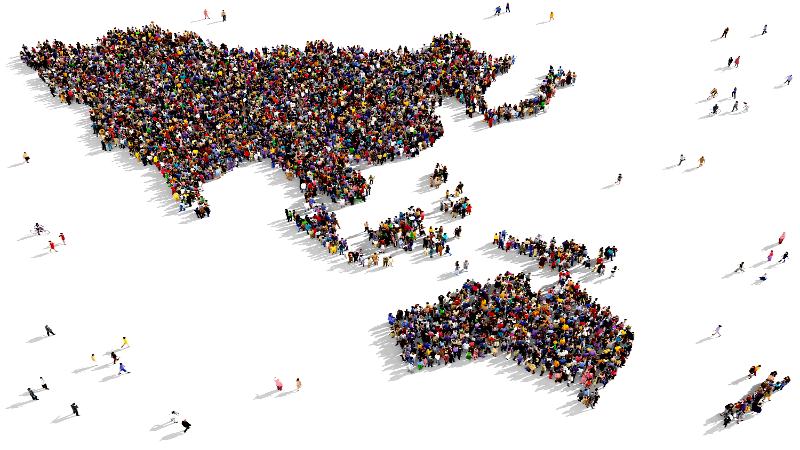Australia-China monthly wrap-up: March 2021
April 07 2021

By Elena Collinson and James Laurenceson, with research assistance from Thomas Pantle
The vestiges of any major divide between the ‘two tribes’, to invoke a descriptor used by a senior Australian public servant – defence and intelligence on the one side and economists and diplomats on the other, in Canberra seem to be closing with respect to strands of thinking on policy towards the People’s Republic of China (PRC). This is reflected in March 25 comments by Australia’s Ambassador to the PRC, Graham Fletcher, who said, ‘I’m not sure China realises the damage that is occurring both in Australia and internationally. It’s been exposed as quite unreliable as a trading partner and even vindictive’. The Ambassador indicated that there is also an acceptance that the relationship is now at an impasse: ‘We’ve got a stand-off. Both sides are very determined…because it’s so public, it’s actually harder for either side to make any such adjustments.’
Both Canberra and Beijing have dug in. A speech by the deputy head of the PRC embassy in Australia Wang Xining to the business community on March 1 emphasised the lack of PRC appetite to find a workable middle ground, framing relations through a Manichean prism:
History will prove that it is wise and visionary to be China’s friends…Those who deliberately vilify China and sabotage the friendship between our two countries and do damage to our long-term friendship and benefits out of their sectoral or selfish interest will be casted aside in history.
His ultimate call for ‘friendly people’ to ‘stay together and help each other’ and the undertaking that ‘Chinese friends will work with you to enhance our mutual friendship and collaboration, breeze through this difficult time for the next spring of China-Australia friendship’ will likely have little resonance in Australia given the costs sustained by industries as a result of Beijing’s coercive economic practices – businesses rendered collateral damage to political disputes. That said, the message of the speech was unlikely to be directed solely at the immediate audience, but rather intended as a show of strength to the domestic population in the PRC and to other countries weighing up their own relations with Beijing.
The PRC government has continued to be intractable in its stance that the onus for any kind of resolution to the current rift remains on Australia. As a PRC Foreign Ministry spokesperson stated on March 16:
The root cause of the current difficulties in bilateral relations is Australia’s wrong words and deeds on issues concerning China’s sovereignty, security and development interests, which have undermined the foundation of mutual trust and cooperation between the two countries. The Australian side knows the ins and outs better than anyone else.
With now virtually no off-ramps from the stalemate available via bilateral negotiations, the Australian government has sought to shift its focus to consolidating multilateral support in mitigating the fallout from the spiralling Australia-PRC relationship, evident this month through the continuing elevation of groupings such as the Quad, a flow of joint statements on issues such as human rights abuses in Xinjiang and tightening controls over Hong Kong, and shows of diplomatic support for other countries traversing complicated relationships with the PRC (for example, sending representatives to Canadian detainee Michael Spavor’s closed-door trial in Dandong on March 19 and Michael Kovrig’s closed-door trial in Beijing on March 22).
The first leader-level talks between the countries comprising the Quad (Australia, the US, India and Japan) were held on March 13, after which Prime Minister Scott Morrison told his Coalition party room that the meeting was ‘the most significant thing to have occurred to protect Australia’s security and sovereignty since ANZUS.’
In parallel, the US this month has increasingly taken up the rhetorical cudgels on behalf of Australia with respect to the deterioration of its relationship with the PRC. National Security Council Coordinator for the Indo-Pacific Kurt Campbell in the lead-up to the first high-level meeting between the Biden administration and the PRC government in Anchorage, Alaska, told the Australian press on March 16 that the US was ‘not going to leave Australia alone in the field’. He said:
We have made clear [to the PRC] that the US is not prepared to improve relations in a bilateral and separate context at the same time that a close and dear ally is being subjected to a form of economic coercion.
The Anchorage exchange opened on March 18 with the US side telling their PRC counterparts, ‘[W]e will always stand up for our principles, for our people, and for our friends’, articulating an intent to touch upon economic coercion during the talks. On March 24 US Secretary of State Antony Blinken in a major speech on America’s alliance relationships in Brussels made it a point to nominate as an ‘urgent threat’ the PRC’s ‘blatant economic coercion of Australia’.
The gestures were received with enthusiasm by senior Australian ministers, with Trade Minister Dan Tehan stating that ‘I think all Australians should be reassured by the fact that the Americans have come out and said that they've got our back, and they won't leave us alone on the playing field.’ The Prime Minister on March 26 said, ‘We are obviously facing some difficult issues in [the trading relationship with the PRC] and really appreciate the great support we’ve had from liberal democracies around the world. None less so than the United States.’
While Washington’s statements may provide some immediate reassurance for Canberra, it remains to be seen what they will materially yield for Australia in the longer term. The demonstrative exchanges will likely only add fuel to the PRC’s long-used political tactic of painting Australia as lacking in independence from the US. And despite recent remarks from the US State Secretary that the US ‘won’t force allies into an ‘us-or-them’ choice with China’, Australia may well be on a path that compels them to do so given US-PRC competition and the moods in Washington and Beijing. PRC Foreign Ministry spokesperson Hua Chunying on March 22 asserted, ‘The attempt to form a clique to pressure and blackmail China, even intimidate China by virtue of someone else won't work. There are direct flights between Australia and China. Taking a detour via the US is only counterproductive.’
On February 23 Canada become the second country, after the US, to term the PRC’s treatment of its Uyghur population in Xinjiang genocide. And on March 2 an independent expert report led by the Newlines Institute for Strategy and Policy in cooperation with the Raoul Wallenberg Centre for Human Rights found that the PRC government’s actions in Xinjiang are in violation of every provision of the United Nations 1948 Genocide Convention, to which the PRC is a signatory. The PRC continues to categorically deny the accusations levelled at it. Australia has been consistent in its criticisms of the abuses occurring in Xinjiang, but has stopped short of applying any particular label to it, with Foreign Minister Marise Payne explaining on March 1, ‘We have a slightly different approach to that turn of phrase, and I don’t mean this in a pedantic or a semantic way. But both the UK and Canada have different mechanisms to make such a declaration, as indeed does the United States. But it’s something which we are examining closely.’
On March 22 the US, UK, Canada and the EU in tandem applied sanctions on PRC officials and entities involved in the internment of Uyghur Muslims in Xinjiang, with a joint statement of support for the measures issued by Australia and New Zealand. While Australia currently lacks Magnitsky-style legislation which allows for such targeted sanctions, it is likely that some iteration of them will be adopted in the near future and potentially applied to the PRC.
In another blow to Australian exporters, on March 26 the PRC’s Ministry of Commerce (MOFCOM) concluded its anti-dumping and anti-subsidy investigations into Australian wine exports (which had commenced on August 18 and August 31 2020, respectively). Having imposed interim tariffs last year, MOFCOM locked in five-year anti-dumping duties ranging from 116.2 to 218.4 percent, and anti-subsidy countervailing duties ranging from 6.3 to 6.4 percent. Prime Minister Morrison on March 27 described the move as ‘not okay’, stating ‘we completely reject that [these duties have] been placed on Australian product and by their own admission, publically, as some form of retaliation for Australians standing up for our values’. The Trade Minister on the same day said that next steps on this front would ‘include looking at taking this matter to the World Trade Organization.’
On March 16 the Trade Minister, asked about the status of the Australian barley case at the World Trade Organization (WTO), replied, ‘[W]e’ve had discussions with the Chinese to try and resolve this…they were very constructive but we weren’t able to resolve the issue.’ Minister Tehan also noted that Australian barley growers have ‘sought new markets’, such as Mexico and Saudi Arabia.
Cumulative trade developments will likely go some way in assisting the Australian government in their efforts to unite the business sector to speak with one voice with the government with respect to the PRC. Treasurer Josh Frydenberg had told a meeting of 150 business executives this month: ‘We’re going to be clear and consistent in our position and that will remain the case. And I think it’s really important as business leaders in this room, you have a role to play as well. We’re all in this together.’
The extent to which non-mining goods exports to the PRC have been hit by political tensions since the dramatic step-change in May 2020 is plainly evident in this month’s data release. The annual value now stands at $19.1 billion, less than what was recorded five years ago: all of the gains following the enactment of the China-Australia Free Trade Agreement (ChAFTA) in December 2015 have been lost.
Even mining exports, which continue to set new record highs in aggregate are, in fact, weaker than the headline number suggests. Aside from iron ore, PRC demand for other major mining products such as coal and LNG have fallen significantly. In the case of coal where the political dispute is the driver of disruption, no exports were recorded by the Australian Bureau of Statistics in January.
Key trade indicators table - March 2021
Elena Collinson is a senior researcher at the Australia-China Relations Institute, the University of Technology Sydney.
Professor James Laurenceson is Director of the Australia-China Relations Institute at the University of Technology Sydney.
Thomas Pantle is Project and Research Officer at the Australia-China Relations Institute, University of Technology Sydney.


